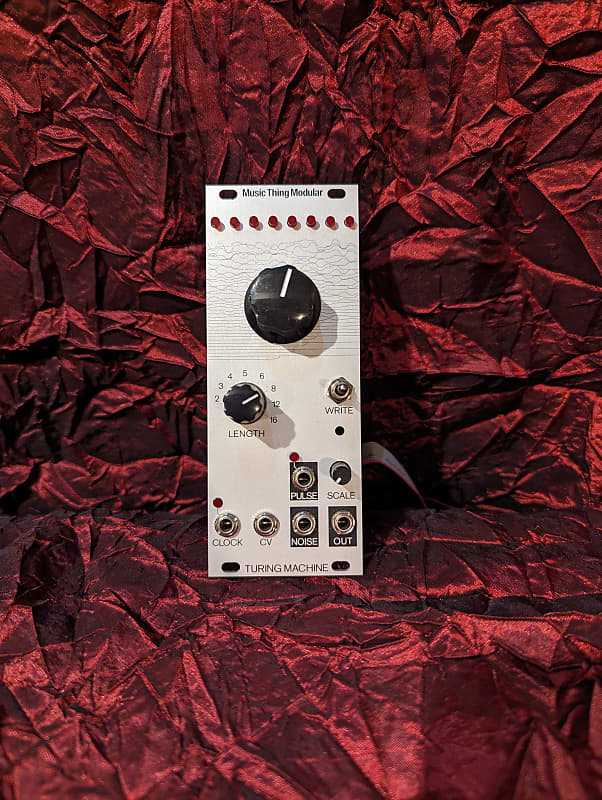Random looping sequencer module
https://www.thonk.co.uk/shop/music-thing-modular-turing-machine-full-diy-kit/
If you had an Unicorn Account you could see a chart with the price development of this module and the average price asked for this module.
This is a randomizing sequencer, DIY, but fully assembled.Description from the manufacturer:The Turing Machine makes music for you. It's a binary sequencer, based around a 16 bit memory circuit called a shift register. It’s a sequencer that you can steer in one direction or another, not one that you can program precisely.You cannot program this sequencer to play specific tunes. You cannot save sequences. You can never go back to a sequence that has changed.To put it another way: the Turing Machine produces clocked stepped randomly changing control voltages. In other words, melodies, basslines, sequences. Unlike many random voltage generators, these sequences can be locked into loops that repeat according to the length control.The Turing Machine has become one of the most popular Eurorack DIY projects since June 2012. The #turingmachine tag on Instagram contains lots of great demos (and a certain amount of the real Alan Turing).Turing Machine Expanders connect to the back of the module, and take the sequence from the main module and use it in different ways:Volts adds an extra voltage output, with the sequence set by five pots.Pulses turns the sequence into beats: eleven rhythmic pulse-train outputs.Voltages adds two CV outputs controlled by 8 faders.Vactrol Mix is a sequencer controlled matrix mixer. It's fantastic for rhythmically cutting up audio, stereo panning and feedback loops, but a little hard to explain.In the Turing Machine, looping is controlled by the big knob.At noon, the sequences are random.At 5 o'clock, it locks into a repeating sequence.At 7 o'clock, it double locks into a repeating sequence twice as long as the 'length' setting.At 3 o'clock or 9 o'clock, it slips; looping but occasionally changing notes.Electronically, the circuit was inspired by the long history of shift register pseudorandom synth circuits, including the Triadex Muse, Buchla 266 Source of Uncertainty and Grant Richter's Noisering.Musically, the module was inspired by 60s and 70s minimalist process music by people like Steve Reich, Terry Riley or Philip Glass: “I am interested in perceptible processes. I want to be able to hear the process happening throughout the music.To facilitate closely detailed listening a musical process should happen extremely gradually.” Steve Reich, Music as a Gradual Process, 1968Turing Machine is open source, which has inspired many offshoots, alternative panels and third party expanders, including:Mystic Circuits' Vert and LeavesGrayscale Modular's PermutationMagpie Modular's crazy combo panelsSoftware Turing Machines inside the Ornament & Crime module, Frames Parasites firmware, Reactor Blocks, VCV Rack Modules and even Mutable Instruments' Marbles.The Turing Machine is not a real Turing Machine the way Alan Turing explained it. The name is vaguely relevant because the module uses a loop of data being changed, but the similarity ends there. It's certainly not a 'probabilistic random sequence generator based on the research of Alan Turing' ;-).The original Mk1 documentation contains more detail about how the Turing Machine works, including a block diagram.The Turing Machine is a fairly straightforward through-hole DIY build, but it's fairly dense and takes a while to complete, so probably shouldn't be a first DIY project (I always recommend Mikrophonie or Mini Drive as first builds). Build documents are available from Thonk. If you get stuck, the Github Issue List is probably the best place to start - remember to check closed issues as well as open ones.

This offer was fetched from reverb.com. You cannot contact the seller via ModularGrid. You have to visit their site.
Look up onDisclaimer: Modules listed for sale on the ModularGrid Marketplace are offered explicitly by their respective owners. ModularGrid is not affiliated to the sellers and takes no legal responsibility in any transaction.
The internet is a rough place and fraudulent behavior can occur. If you are concerned about dealing with strangers consider buying your module at an authorized dealer.